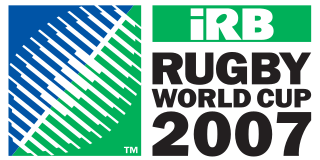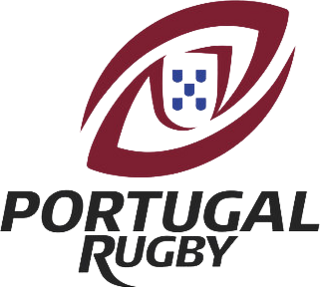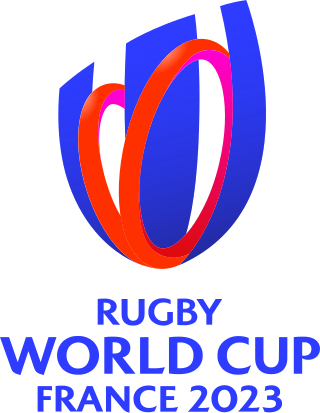
The Men's Rugby World Cup is a rugby union tournament contested every four years between the top international teams, the winners of which are recognised as the World champions of the sport.

The 1999 Rugby World Cup, was the fourth Rugby World Cup, the quadrennial international rugby union championship, the first World Cup to be held in the sport's professional era.

The 2007 Rugby World Cup was the sixth Rugby World Cup, a quadrennial international rugby union competition organised by the International Rugby Board. Twenty nations competed for the Webb Ellis Cup in the tournament, which was hosted by France from 7 September to 20 October. France won the hosting rights in 2003, beating a bid from England. The competition consisted of 48 matches over 44 days; 42 matches were played in 10 cities throughout France, as well as four in Cardiff, Wales, and two in Edinburgh, Scotland.

The 1995 Rugby World Cup, was the third Rugby World Cup. It was hosted and won by South Africa, and was the first Rugby World Cup in which every match was held in one country.

The 1991 Rugby World Cup was the second edition of the Rugby World Cup, and was jointly hosted by England, Scotland, Wales, Ireland and France: at the time, the five European countries who participated in the Five Nations Championship. This was the first Rugby World Cup to be staged in the northern hemisphere, with England the hosts of the final. Also for the first time, qualifying competitions were introduced as the number of entrants had increased, from 16 nations four years earlier, to 33 countries. The eight quarter-finalists from 1987 qualified automatically with the remaining eight spots contested through qualifiers by 25 countries. This resulted in only one new side qualifying for the tournament, Western Samoa replacing Tonga. The same 16-team pool/knock-out format was used with just minor changes to the points system. South Africa was again not included because of sanctions imposed on the country by the International Rugby Board (IRB), due to the government's apartheid policies.
The first Rugby Union World Cup was held in 1987, hosted by Australia and New Zealand who pushed for the tournament to be approved. Since the first tournament, 9 others have been held at four-year intervals.

The Portugal national rugby union team, nicknamed Os Lobos, represents Portugal in men's international rugby union competitions. The team, as well as all rugby union in Portugal, is administered by the Federação Portuguesa de Rugby.
This article presents the national team appearances in the Rugby World Cup. The article tracks the appearances, results, and debuts for all national teams that have participated in at least one Rugby World Cup.
For the 1991 Rugby World Cup, 16 nations participated in the finals tournament, half of which came through qualifying matches, and the other were granted automatic entry as they were quarter-finalists at the 1987 Rugby World Cup. The 25 teams taking part in regional qualifiers together with the 8 teams which qualified automatically brings to 33 the total number of teams participating in the 1991 Rugby World Cup.

The International Rugby Board (IRB) awarded the 2007 Under 19 Rugby World Championship to the Irish Rugby Football Union (IRFU) and the Ulster branch hosted it. The Tournament, which took place in Belfast, Northern Ireland from 4–21 April, was split into two divisions of twelve teams. Division A games took place in Belfast at Belfast Harlequins' Deramore Park, Ulster Rugby's Ravenhill Stadium, and Cooke RFC/Instonians' Shaw's Bridge complex. Division B games were held in Queen's University of Belfast's The Dub complex and Malone RFC's Gibson Park in Belfast, and Bangor RFC's Upritchard Park in Bangor.

2011 Rugby World Cup qualifying began at the 2007 tournament in France, where twelve teams earned a place in the finals of the tournament, this automatically qualified them for the 2011 Rugby World Cup in New Zealand.
In the African Regional qualifying process, 14 of the 15 eligible IRB member nations took part.

The Gold Cup is the premier rugby union club competition in South Africa for non-university teams.

The European Rugby Champions Cup is an annual rugby union tournament organised by European Professional Club Rugby (EPCR). It is the top-tier competition for clubs who compete in a predominantly European league. Clubs qualify for the Champions Cup via their final positions in their respective national/regional leagues or via winning the second-tier Challenge Cup; those that do not qualify are instead eligible to compete in the second-tier Challenge Cup.

The EPCR Challenge Cup is an annual rugby union competition organised by European Professional Club Rugby (EPCR). It is the second-tier competition for clubs based in European leagues behind the European Rugby Champions Cup. From its inception in 1996 to 2014, it was known as the European Challenge Cup and governed by European Rugby Cup (ERC). Following disagreements in the structure of the tournament's format and division of revenue, the English and French leagues withdrew to form the EPCR, which organized the Challenge Cup and the Champions Cup since the 2014–15 season.

The 2023 Rugby World Cup was the tenth men's Rugby World Cup, the quadrennial world championship for national rugby union teams. It took place in France from 8 September to 28 October 2023 in nine venues across the country. The opening game and final took place at the Stade de France, north of Paris. The tournament was held in the bicentenary year of the purported invention of the sport by William Webb Ellis.
The qualification process for the 2023 Rugby World Cup in France began during the pool stages of the 2019 tournament in Japan, at which the top three teams from each of the four pools qualified automatically for the 2023 event. A further eight teams qualified through regional, cross-regional play-offs and the repechage process.
The 2021–22 Rugby Africa Cup, which doubled as Qualifying for the 2023 Rugby World Cup for Africa began in June 2021, where teams competed for one direct qualification spot into the final World Cup tournament and for one place in the final Qualification Tournament.
The 2022–23 European Rugby Champions Cup was the ninth season of the European Rugby Champions Cup, the annual club rugby union competition run by European Professional Club Rugby (EPCR) for teams from the top five nations in European rugby and South Africa. It was the 28th season of pan-European professional club rugby competition.

The 2022–23 EPCR Challenge Cup was the 9th edition of the EPCR Challenge Cup, an annual second-tier rugby union competition for professional clubs. Including the predecessor competition, the original European Challenge Cup, this is the 27th edition of European club rugby's second-tier competition.












